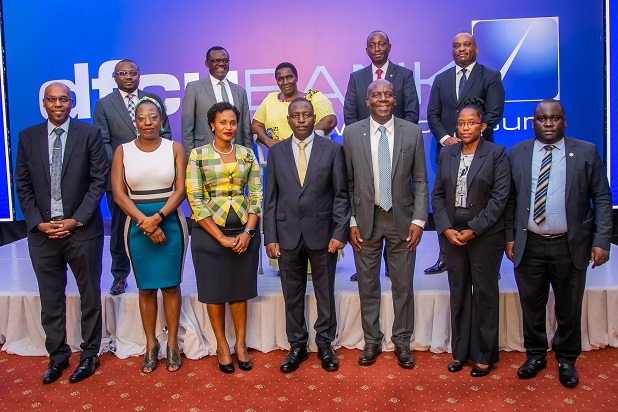Shem Kakembo, the Managing Director at EFC Uganda Limited
EFC Uganda Limited (MDI) – Uganda’s fastest-growing microfinance institution has rolled out a campaign dubbed “SIMBULA LOANS NE EFC.’’ The campaign is focused on enhancing the institution’s commitment of contributing to Uganda’s development and economic stability through key drivers like financial inclusion. We interviewed Shem Kakembo, the Managing Director at EFC Uganda Limited (MDI) about the institution’s journey and what the ‘SIMBULA LOANS NE EFC’ campaign is all about.
Below are the excerpts of the interview;
Q: Briefly tell us about EFC (U) Ltd and the journey to being one of the most recognized financial institutions.
A: EFC joined this market in 2012. The main promoter being the Canadian Financial Services Group (DID) who partnered with Gatsby Trust of Uganda to create EFC. In January 2013, we were joined by Belgian Investment Organization (BIO). In November 2013, we applied and received the MDI License from Bank of Uganda. So, EFC is regulated and supervised by Bank of Uganda.
Q: You have rolled out a campaign called “Simbula Loans ne EFC”. What is the background of this campaign and what’s all about?
A: The Simbula Loans ne EFC is a campaign designed to welcome back everyone from the two-year Covid -19 pandemic. It is announcing that as EFC, we are open to lending activities at very affordable rates. The campaign is targeting entrepreneurs.
As for eligibility for loan customers, a customer or prospect must be an entrepreneur or merchant, must be of age of majority, have at least 6 months of experience in the same business, demonstrate capability of operating a profitable business and must have collateral like business equipment, vehicle, house, or land.
The minimum loan amount offered is five million Uganda shillings (5,000,000UGX) with a maximum repayment period of up to sixty (60) months. The “Simbula loans ne EFC campaign” is targeting to extend loans close to UGX 13.5 BN and will run for three months (April -June). We encourage everyone to come to EFC and utilize this opportunity, the campaign is here to help us get back into business.
Q: Apart from the “Simbula Loans ne EFC” campaign, what other interventions has EFC extended to customers to support economic recovery following the Covid -19 pandemic?
A: At the onset of the pandemic in 2020, EFC was one of the very first institutions to offer loan repayment holidays to customers. For institutions like schools, we reduced the interest rates of their loans to 0% to help them in the journey to recovery. We are also part of the Small Business Recovery Fund where entrepreneurs can come and get loans of up to UGX 100 million at very low interest rates of not more that 10%. This is in partnership with Bank of Uganda.
Q: The pandemic has affected several businesses in wide ranging ways. In terms of business operations, what have been your key take aways in the last two years?
A: The last 2 years have been challenging for everyone and especially our people. One of the take aways has been the fact that it’s important for us to be around and come up with solutions to cater for those problems our people go through.
At EFC, we made it clear that we will not lay off any of our staff and instead we ensured to have the depth of the financial strength in our balance sheet to continue paying everyone’s salaries irrespective of whether the business was running as fast as we wanted to or not. Most importantly, we listened and offered advice.
Q: A good savings and investment culture is a critical function in economic development. What are your views regarding Uganda’s saving culture and what’s your advice to Ugandans in as far as savings is concerned?
A: We all know that Uganda is a developing country. We understand that developing countries have a number of challenges, one of them is the low savings culture. We also know that the poor save, they might not save in monetary terms but instead make the saving through items like cattle purchase. The challenge with this kind of saving is that you must monetize the cow or sheep in times of need. And this means that one must sell it all off. Uganda’s saving culture still needs to be improved. Recently, we see a number of savers, 45 years of age and above receiving their benefits from NSSF for things like personal investment. This is a true testament to what saving does. It is undoubtedly true that the saving culture in Uganda still has some way to go and we encourage the public to save at least 20 to 30% of their income if they can.
Q: Lastly, can you highlight on some of EFC’s Key milestones over the years?
A: EFC came into the market in 2012.We have had some significant growth. For the first 7 years of existence, we were managed by expatriates (Canadians). Later, in 2018 we brought in Ugandans to run the organization. We had our first profit in 2019. We were also named as the fastest growing financial institution; growth is in our DNA.
Q: What should the customers and the stakeholders expect over the next 5 years?
A: In the future starting this year, we expect to have our license upgraded to Tier 2 ; very soon, you will see EFC Bank. We are confident that this will open up a new horizon for our customers, our staff and everybody generally.






